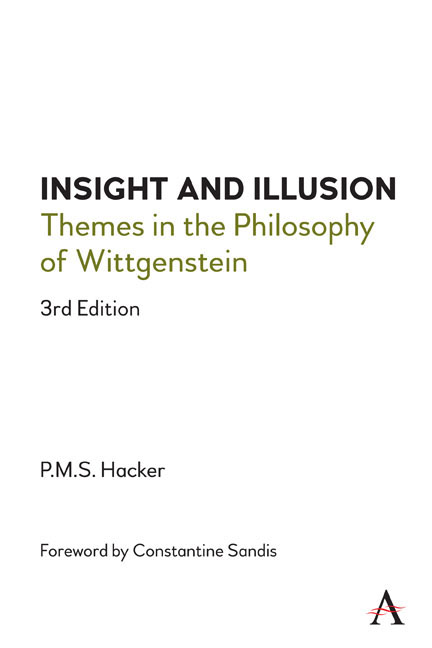Book contents
- Frontmatter
- Dedication
- Contents
- FOREWORD
- PREFACE TO THE REVISED EDITION
- PREFACE TO THE FIRST EDITION
- LIST OF ABBREVIATIONS
- I WITTGENSTEIN’S EARLY CONCEPTION OF PHILOSOPHY
- II THE DIALOGUE WITH FREGE AND RUSSELL
- III MEANING, METAPHYSICS, AND THE MIND
- IV EMPIRICAL REALISM AND TRANSCENDENTAL SOLIPSISM
- V DISINTEGRATION AND RECONSTRUCTION
- VI WITTGENSTEIN’S LATER CONCEPTION OF PHILOSOPHY
- VII METAPHYSICS AS THE SHADOW OF GRAMMAR
- VIII THE REFUTATION OF SOLIPSISM
- IX PRIVATE LINGUISTS AND PUBLIC SPEAKERS
- X ‘A CLOUD OF PHILOSOPHY CONDENSED INTO A DROP OF GRAMMAR’
- XI CRITERIA, REALISM AND ANTI-REALISM
- INDEX
I - WITTGENSTEIN’S EARLY CONCEPTION OF PHILOSOPHY
Published online by Cambridge University Press: 24 February 2022
- Frontmatter
- Dedication
- Contents
- FOREWORD
- PREFACE TO THE REVISED EDITION
- PREFACE TO THE FIRST EDITION
- LIST OF ABBREVIATIONS
- I WITTGENSTEIN’S EARLY CONCEPTION OF PHILOSOPHY
- II THE DIALOGUE WITH FREGE AND RUSSELL
- III MEANING, METAPHYSICS, AND THE MIND
- IV EMPIRICAL REALISM AND TRANSCENDENTAL SOLIPSISM
- V DISINTEGRATION AND RECONSTRUCTION
- VI WITTGENSTEIN’S LATER CONCEPTION OF PHILOSOPHY
- VII METAPHYSICS AS THE SHADOW OF GRAMMAR
- VIII THE REFUTATION OF SOLIPSISM
- IX PRIVATE LINGUISTS AND PUBLIC SPEAKERS
- X ‘A CLOUD OF PHILOSOPHY CONDENSED INTO A DROP OF GRAMMAR’
- XI CRITERIA, REALISM AND ANTI-REALISM
- INDEX
Summary
Background
Ludwig Wittgenstein came to Cambridge in 1912 in order to study under the supervision of Bertrand Russell. It was the beginning of seven years of intensive and single-minded research in logic and philosophy which resulted in the only book Wittgenstein published in his lifetime, the Tractatus Logico-Philosophicus.It is not to the present purpose to investigate the wide range of philosophical views embodied in that work, but rather to examine the conception of philosophy propounded in it. In order to do so, some appreciation of Wittgenstein's intellectual background and the problem-setting context of his work is necessary. For a twenty-three-year-old research student of philosophy, Wittgenstein in 1912 was remarkably ill-read in the history of the subject. His intellectual milieu was that of a highly cultured and sophisticated member of the Viennese intelligentsia. His training was, however, scientific. In 1906 he had begun studying engineering in the Technische Hochschule in Berlin-Charlottenburg, and in 1908 he came to Manchester to pursue research in aeronautics. In the course of research into the design of a jet-reaction propeller he was led from dynamics to pure mathematics, and from there to logical and philosophical investigations into the foundations of mathematics. He apparently read Russell's Principles of Mathematicsand was greatly impressed by this imposing work which had, significantly, germinated in theoretical problems in dynamics. It was probably the appendix to the Principles of Mathematicswhich led Wittgenstein first to read the works of Frege, and then to visit him. On Frege's advice he returned to England to study under Russell.
Wittgenstein, like any well-educated Viennese at the turn of the century, had read Schopenhauer in his teens. He is reported to have been greatly impressed, and he told von Wright that his first philosophy was a Schopenhauerian epistemological idealism. It was not, however, a Schopenhauerian interest which brought him to philosophical investigation. Although Schopenhauer's influence upon the later sections of the Tractatusis profound, it is clear from Wittgenstein's correspondence with Russell, from the 1913 and 1914 notes on logic and from the three remaining philosophical notebooks covering the periods from 22 August 1914 to 22 June 1915, and from 15 April 1916 to 10 January 1917, that the driving force behind his investigations was logic and its metaphysical implications.
- Type
- Chapter
- Information
- Insight and IllusionThemes in the Philosophy of Wittgenstein, pp. 1 - 27Publisher: Anthem PressPrint publication year: 2021

